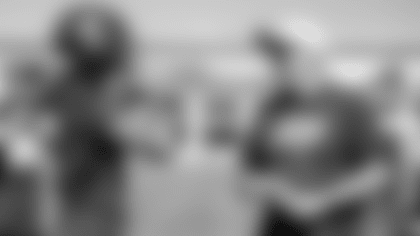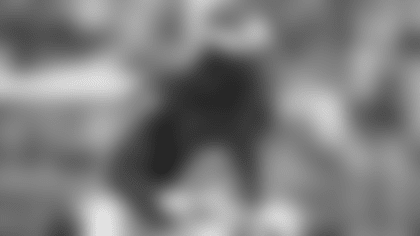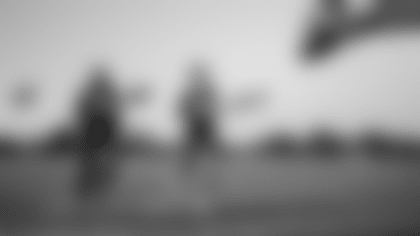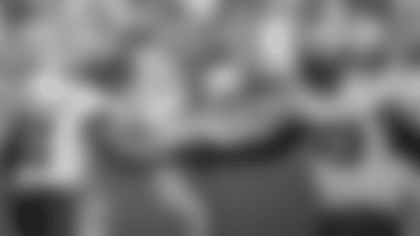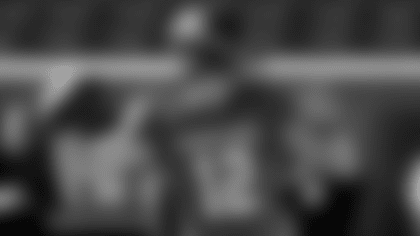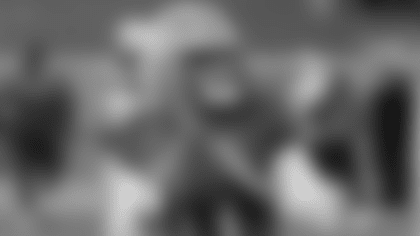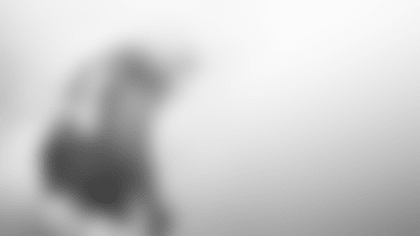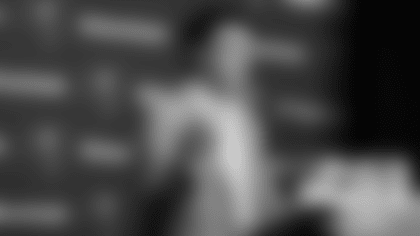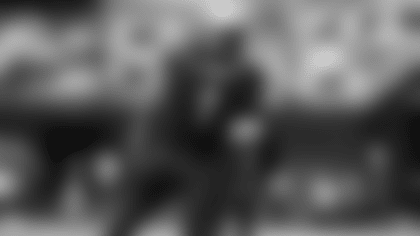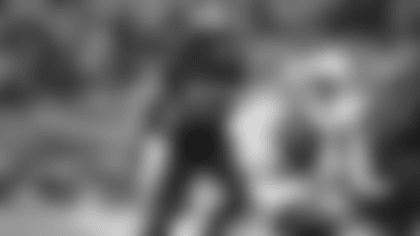It wasn't been all bad at home for the Bucs in 2003-04; WR Joey Galloway and his teammates flexed their RJS muscles with a 27-0 win over Atlanta last December
Raymond James Stadium opened on September 20, 1998, and on its very first day played host to a Tampa Bay Buccaneers-Chicago Bears skirmish.
The Buccaneers, who had just finished an unprecedented seven-game road swing while the stadium's final touches were put in place, proceeded to sleep-walk through the first 30 minutes of football in their gleaming new home. At halftime, the Bucs were down to the Bears, heavy underdogs, by a 15-0 score.
Then, on the opening possession of the third quarter, the Bucs powered 81 yards and Reidel Anthony caught a touchdown pass to make it 15-7. A few minutes later, Dave Moore turned in the play of his career, pulling down an overthrown bomb one-handed and diving into the end zone for another score. The Bucs scored on four straight possessions and won 27-15.
And from that moment on, RJS was magical for the Tampa Bay Buccaneers.
Until 2003.
During the five seasons from 1998 through 2002 – the final season of which ended in Tampa Bay's Super Bowl Championship – the Buccaneers built and enjoyed one of the top home-field advantages in the NFL. Over those five years, the Bucs were 32-10 in Raymond James Stadium (including the postseason), a 76.2% success rate. That was easily the best five-year home stretch in team history and at the time was among the best home-game records in the NFL. RJS was approaching the type of hostile-territory status usually reserved for Mile High Stadium and Lambeau Field.
Over the last two years, shockingly, the Bucs have been 7-9 at home. Obviously, the Bucs had one of the league's best teams from 1998-92, home or away, while the last two years saw a big dip in the overall record. Still, many of the Bucs' 16 home games over the past two seasons have been tight games taken down to the final minutes, and that's the type of contest they would routinely win before 2003. Whether it was Carolina with a blocked extra point, Seattle with a takeaway at the goal line or New Orleans with a game-winning drive, it's the opposition that has made the big play and felt at home in Raymond James Stadium over the past two years.
The Bucs long for a return of the good old days and are determined to make that happen.
"We know we have to get back to defending our home court," said defensive end Ellis Wyms. "I mean you have to defend your home. We have to win Tampa Bay games to get to the playoffs. It's hard to get to the playoffs without playing well at home.
"It's been two years and we're not playing the type of football this area is used to seeing. We just have to get back to what we do on Sunday and that is dominate whoever comes in the stadium."
As quickly as the Bucs' home-field advantage materialized in the second half of that opener in 1998, it seemed to vanish in the closing seconds of the '03 opener, when the Panthers blocked the point after that would have won the game in regulation. That may have seemed like a fluke until Indianapolis pulled off a stunning comeback in Tampa two weeks later, and Green Bay broke its four-game losing streak in RJS a month after that. The home woes just kind of snowballed. The Bucs think it can work in the other direction, too. Get the season started off the right way at home and the more domination will follow.
"We want to establish home field advantage in a way, get our momentum back winning at home," said linebacker Derrick Brooks, one of only a handful of current Bucs who played in that Chicago game in 1998. "Now that's something we haven't done the past few years. Like I said, establish a streak; obviously the faster you can get off, the better you're playing. We just want to go out, play as hard as we can on Sunday, and hopefully get a win."
Statistics show a built-in home-field advantage throughout the NFL, but some teams consistently fare better in their own stadiums than others. Sometimes the reasons aren't obvious, or at least provable. Are the Broncos more used to the thin air? Do the Packers handle the cold better? Are the Rams more effectively built for artificial turf than their opponents?
Some of it's not so mysterious, however. Intense crowd noise is a definite factor in some places, such as Minnesota, where the Bucs just quieted a usually overwhelming Metrodome din in Sunday's win over the Vikings. Raymond James Stadium isn't a dome, but it still can get very, very loud when the Bucs are giving the fans reason to do so. That's a chicken-and-egg thing; crowd noise will help the home team get the upper hand, but the home team has to perform will first to get the crowd into the game.
That means the Bucs need a fast start.
"We've got to help them get excited with good, quality play from the beginning of the game," said Gruden. "They'll be there; they've always been there for us. But we've certainly got to improve our home performances and send them away happy more often."
Or, as defensive tackle Anthony McFarland put it: "It doesn't matter where you play initially, because you have to go out and play well to give yourself an opportunity to use your home-field advantage."
In a way, the Bucs have already gotten off to a fast start. Thanks to a dominating road win over a strong opponent in the season opener, the team has pumped up the fans' expectations for the season, and that should add electricity to the air on Sunday, even before kickoff. Wyms, who walked off the Metrodome field happy, expects to feel just as good when he walks onto the Raymond James Stadium grass on Sunday.
"Anytime you come to Ray Jay, no matter what the situation, coming off a win or a loss, it's always a pick me up when you walk into the stadium," he said. "You know the fans want to see you do well and are pushing for you."
Fans want to see the Buccaneers defend the Bay area's honor. It's a personal thing. The players have a similarly emotional attachment to their home turf.
"This is our house, so to speak, and we don't want anybody coming into our house and taking anything," said safety Jermaine Phillips. "We're not going to let that happen. I think [this] home is going to be better for us this year than the last couple of years."



